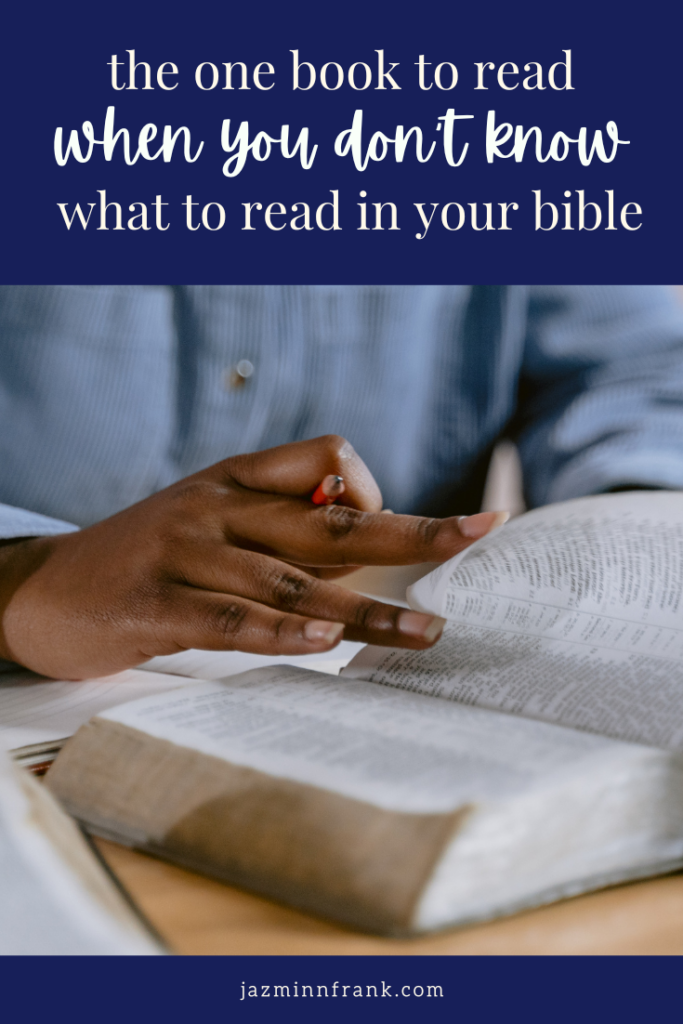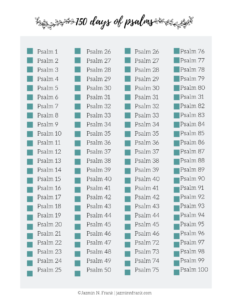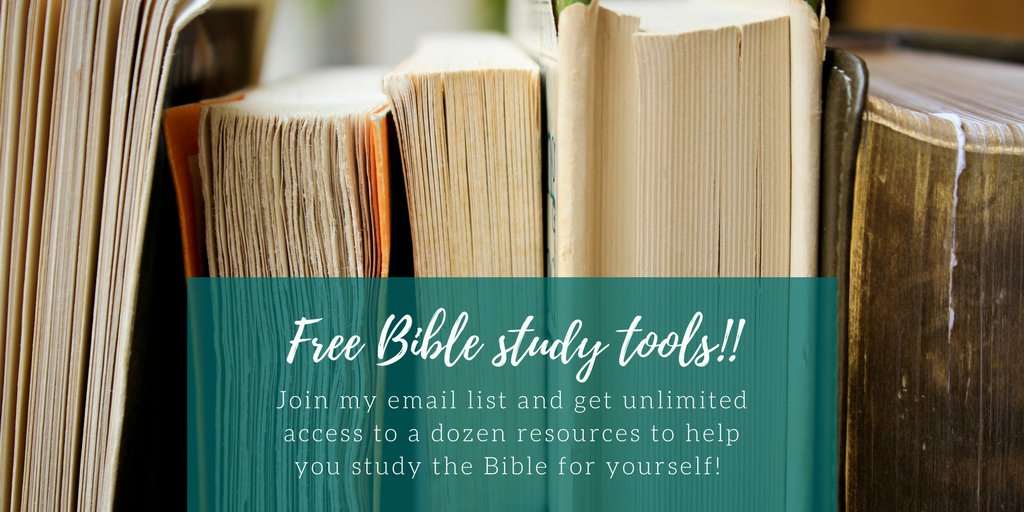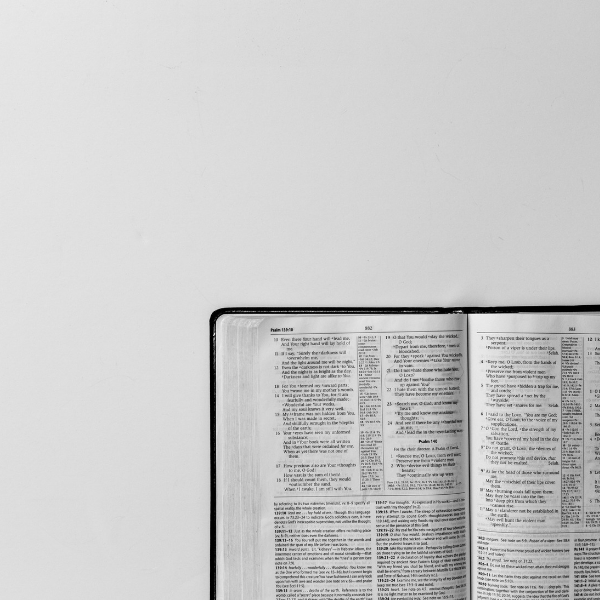Sometimes it’s hard for me to read the Bible, mostly because I don’t know what to read. That feeling can come because the Bible is so big and full of so many books it can be overwhelming to just pick something. I have this habit of wanting to pick the right something, and lately that unease over what to read has come because of a heavy and anxious heart.
When my heart is in that state, when my life is stressful, it can be hard to pick up my Bible and read.
Normally I have some sort of reading plan to fall back on in these situations, but even that has been hard to get into. I know this is where discipline is supposed to come in–all those years of developing the habit of reading my Bible. When the heart is heavy or life is busy you still get up and read your Bible even if you aren’t feeling it.
But I also know if I happen to be in Numbers for my assigned reading of a seemingly never-to-end count of Israel’s men, or something like that, I won’t read. My eyes will scan the page, but my brain and my heart won’t absorb anything, and it’s as if I didn’t read anything anyway.
When I approach my Bible in those hard-to-keep-the-discipline seasons, there is one section of Scripture I always fall back on: the Psalms.
What is the Book of Psalms?
The book of Psalms is book of lyrical poetry. Found tucked into the near center of the Old Testament, it is classified as wisdom literature. Usually if you flip your Bible open somewhere to the middle, you’re opening up to one of the 150 psalms.
Unlike most other books of the Bible, Psalms has many contributors and was organized over many years. David wrote quite a few of them and some are left unclaimed.
These lyrical poems cover a wide range of topics and emotions, some are psalms of worship, others psalms of prayer. All of them are about God’s relationship with humanity and humanity’s relationship with him.
{Want to read more about the Psalms? I found this article quite helpful in preparing this post: Intro to Psalms.}
Why Read the Psalms?
Because of the content and structure of the Psalms, this is often the book I land in when I don’t know what to read.
They are short. Psalms are bite-sized bits of Scripture that can be read in a matter of minutes or even seconds if you land on a short one; or they can be meditated on and dissected for hours. The length of these passages make it easy to still read Scripture on busy days, or feed a hungry and weary heart that doesn’t know where else to turn.
They are emotion driven. Because they are prayer and worship and poetry, these short passages are chock full of emotion. As one who has trouble identifying and embracing my emotions, the Psalms help me enter into communion with God at the heart level without my normal questions and trying to put my best foot forward. They get to a heart level a lot more quickly and spark honest conversation with God.
They are prayers. If you’re familiar with the idea of praying Scripture–literally taking the words of the Bible and praying them back to God–Psalms are a great source for that because many are prayers to begin with. Take Psalm 27:4 for example:
One thing have I asked of the Lord,
that will I seek after:
that I may dwell in the house of the Lord
all the days of my life,
to gaze upon the beauty of the Lord
and to inquire in his temple.
This is a psalm I come back to often because David is expressing a heart desiring to know God better. It is a request I make regularly. Lord, let me dwell with you all my days..

They are worship. The psalms are also worship, songs and poems written to praise God. Allowing our hearts to turn to God not just in prayer and asking him for things, but simply praising him helps our hearts get back on track as we are reminded who he is. Psalm 8 is a great example:
O Lord, our Lord,
how majestic is your name in all the earth!
You have set your glory above the heavens.
Out of the mouth of babies and infants,
you have established strength because of your foes,
to still the enemy and the avenger.
When I look at your heavens, the work of your fingers,
the moon and the stars, which you have set in place,
what is man that you are mindful of him,
and the son of man that you care for him?Yet you have made him a little lower than the heavenly beings
and crowned him with glory and honor.
You have given him dominion over the works of your hands;
you have put all things under his feet,
all sheep and oxen,
and also the beasts of the field,
the birds of the heavens, and the fish of the sea,
whatever passes along the paths of the seas.
O Lord, our Lord,
how majestic is your name in all the earth!
They can be read in any order. While the structure and organization of the Psalms is intentional, they can be read in any order on their own. Lately I’ve been skipping around, opening my Bible and just reading the first psalm I see. I don’t use this practice of Bible reading often because I think context and continuity matter, but for this season right now, this is good for me.
Start your 150 Days in the Psalms

On days when I don’t know what to read, I’ve been pulling out a reading guide with the psalms on it and checking them off as I go. I don’t read here every day, and sometimes when I do hop back to Psalms, I read the same one multiple times because I find it especially impactful. I created this reading guide to help you do the same.
Whether you spend the next 150 days reading one psalm a day, or you use this as your I-don’t-know-what-to-read-today guide, this will help you move through the entire books of Psalms. Read in order or skip around. That’s the beauty of this book. Pop in and out at your leisure.
You can download the 150 Days of Psalms reading plan, as well as other plans and studies from my resource library. Don’t have access yet? Sign up here!
Community question: Do you have a favorite psalm you often return to or have memorized?
Related: How to Meditate on God’s Word
Live in his love!


Sign up to get access to reading plans, Bible study guides, Scripture memory cards and more!


I agree, the Psalms are always encouraging, no matter what season I’m going through. Psalm 8 is one of my favorites too!
I love to rewrite the Psalms to fit my circumstances. Psalm 119 is one of my favorites because I desire to seek Him with my whole heart. I hope you don’t mind if I link your blog to mine this week.
That’s awesome! And by all means, link away 😉